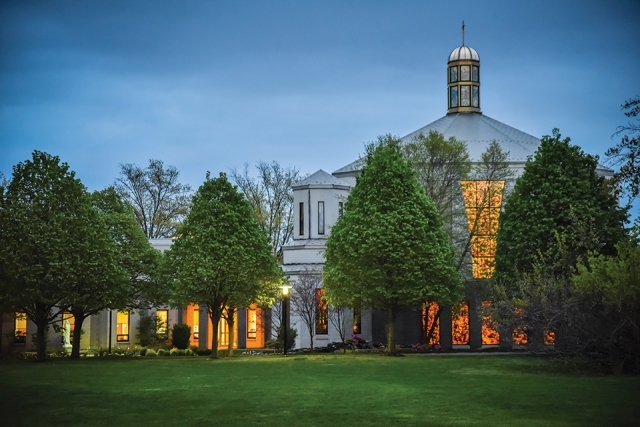
As St. John’s marks its 150th anniversary this year, it can make a claim that few other institutions of higher education can assert: “Namely, we can say truthfully that the doctrine of papal infallibility and its accompanying charism are as old as St. John’s.”
Christopher D. Denny, Ph.D., Associate Professor, Department of Theology and Religious Studies, St. John’s College of Liberal Arts and Sciences, made that observation as he delivered a Three Things Talk, “Ad Intra (to the inside), Ad Extra (to the outside): Papal Infallibility after 150 Years.” The talk, sponsored and hosted by St. John’s Vincentian Center for Church and Society, was held as a Webex event on Saturday, October 24.
Dr. Denny teaches undergraduate and graduate courses in historical theology from the patristic to the modern era. He is the recipient of best article awards from the Catholic Press Association (now the Catholic Media Association), The College Theology Society, and The Conference on Christianity and Literature.
The Three Things Talks is a series that addresses issues of Catholic belief and teaching. The talks are intended for Catholics who want to know more about their faith, as well as for those who are interested in various beliefs that Catholics hold.
During the 2020–21 academic year, the Three Things Talks are planned to reflect the current sesquicentennial celebration of St. John’s University. “We shall offer presentations that keep the 150 years in our minds and celebrate our heritage in faith,” said Rev. Patrick J. Griffin, C.M., Executive Director, Vincentian Center for Church and Society, during his welcoming address. “Faithful to the Mission” is the theme of the 150th anniversary celebration.
In later remarks, Fr. Griffin said, “The Catholic doctrine of papal infallibility means that the Pope, under the guidance of the Holy Spirit, can speak authoritatively on important matters of faith and morals. Dr. Denny introduced his presentation wonderfully as he pictured the historical situation that gave rise to the pronouncement at Vatican I and then he recognized its development through Vatican II.”
Dr. Denny focused his talk on how the First Dogmatic Constitution on the Church of Christ, Pastor aeternus, which was issued in Rome, Italy, on July 18, 1870, by the First Vatican Council, transformed the church’s understanding of the papacy and Catholicism’s relationship to the wider world.
Within the document, the First Vatican Council decreed the doctrine of papal infallibility as being that, under certain prescribed circumstances, the pope can proclaim a teaching which is without error. Therefore, such dogma is “irreformable”—unable to be revised or altered.
In describing internal church and worldly events that preceded the bishops’ votes on the text of Pastor aeternus, Dr. Denny indicated it was a tumultuous period within and outside the Catholic Church that was marked by anti-Catholicism and anticlericalism. This period included events such as repeated military invasions of Rome; the start of the French Revolution, during which a law was passed to forbid the Pope from interfering in the affairs of the Catholic Church; the imprisonment of Pope Pius VI for being viewed as disloyal to the French revolutionaries; and the executions of large numbers of nuns and priests who did not pledge loyalty to the revolution. In addition, monasteries were looted and destroyed.
“After two decades of war and atrocities, the Catholic Church had learned its lesson, namely, political liberalism was dangerous, democracy was a menace, the ideology of progress was a threat, and finally, if the church was to maintain its God-given role as the teacher and ruler over Christ’s flock, it must resist calls for religious and social change,” Dr. Denny explained. “In July of 1870, the emerging modern world outside the walls of Rome, ad extra, had grown strange and dangerous for a Catholic Church that had not convened an ecumenical council for more than 300 years.”
When the Second Vatican Council, or Vatican II, convened from 1962 to 1965, the body issued another Dogmatic Constitution on the Church of Christ, Lumen gentium, which, in part, reiterated the doctrine of papal infallibility approved by Vatican I, said Dr. Denny. But the Second Vatican Council also insisted that “all bishops are given their teaching authority directly from the Holy Spirit,” he said.
“Pastor aeternus remains as relevant today as it was when the First Vatican Council was convened,” said Dr. Denny, “even if Catholics today…work to understand how papal infallibility can function in new ways to build up the Body of Christ.”
Related News
St. John’s ROTC Program Prepares Next Generation of Army Leaders
St. John’s University’s Army Reserve Officers’ Training Corps (ROTC) program experienced a changing of the guard earlier this year when 19-year United States Army officer Lt. Col. Matthew Pride and...
Alumna Celebrates Book Launch After Career Change
After developing a passion for helping the younger generation, Ashley Wilson ’14M.S.Ed. pivoted from a career in the music industry to work as an educator. She is also making her mark through her new...
Christmas Card 2025
A Christmas message from Rev. Brian J. Shanley, O.P., President of St. John’s University.
